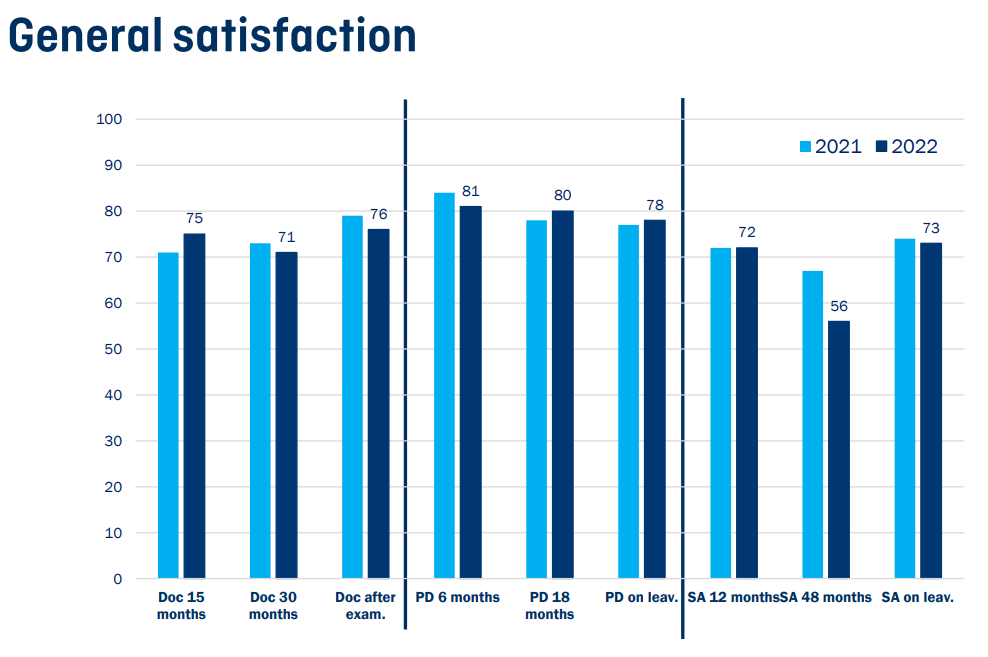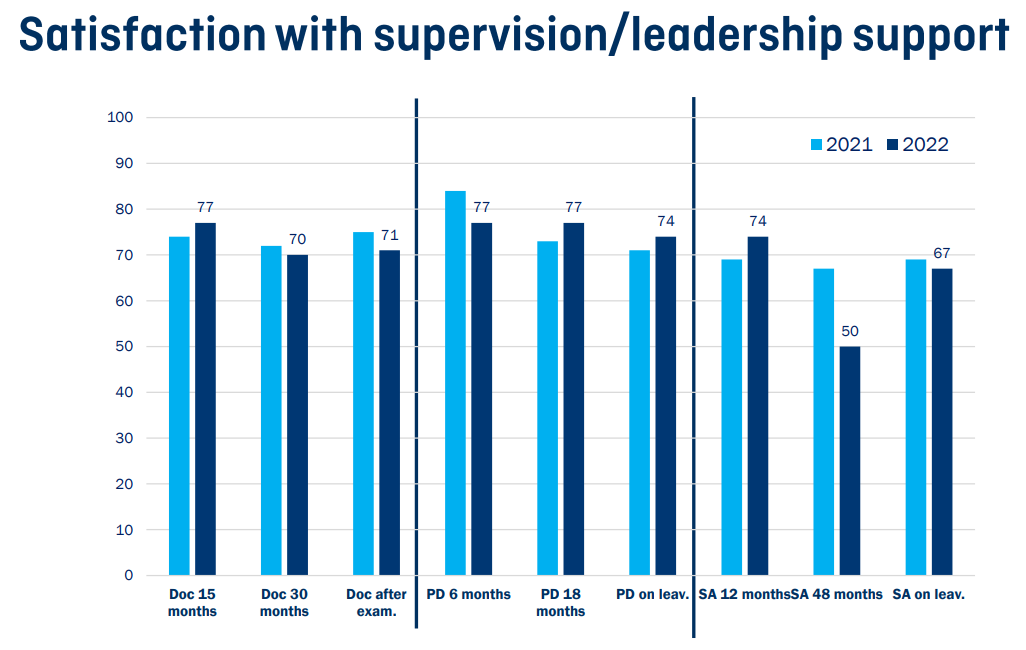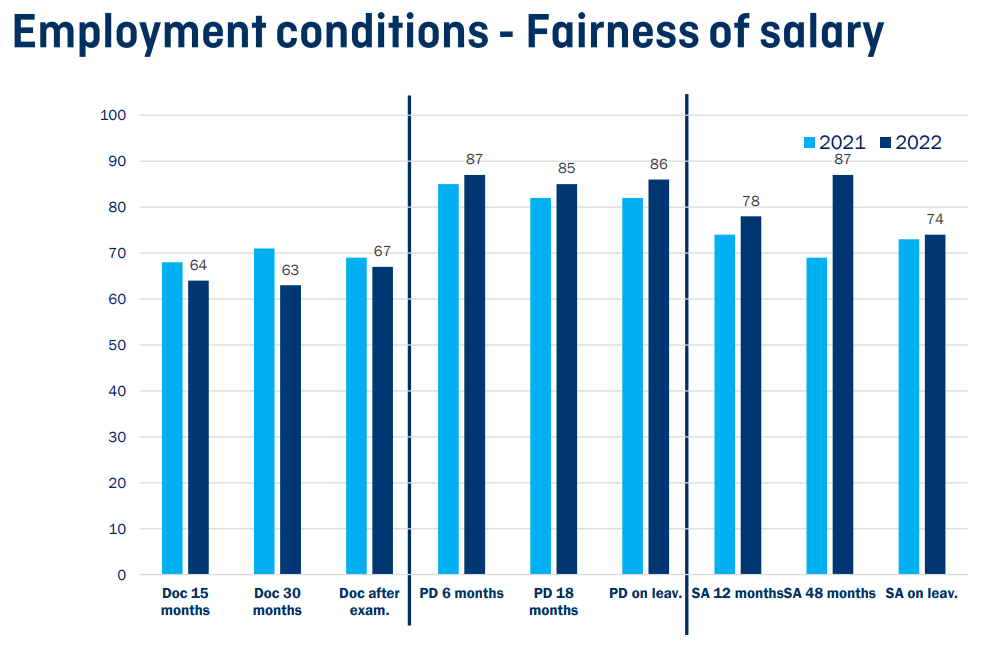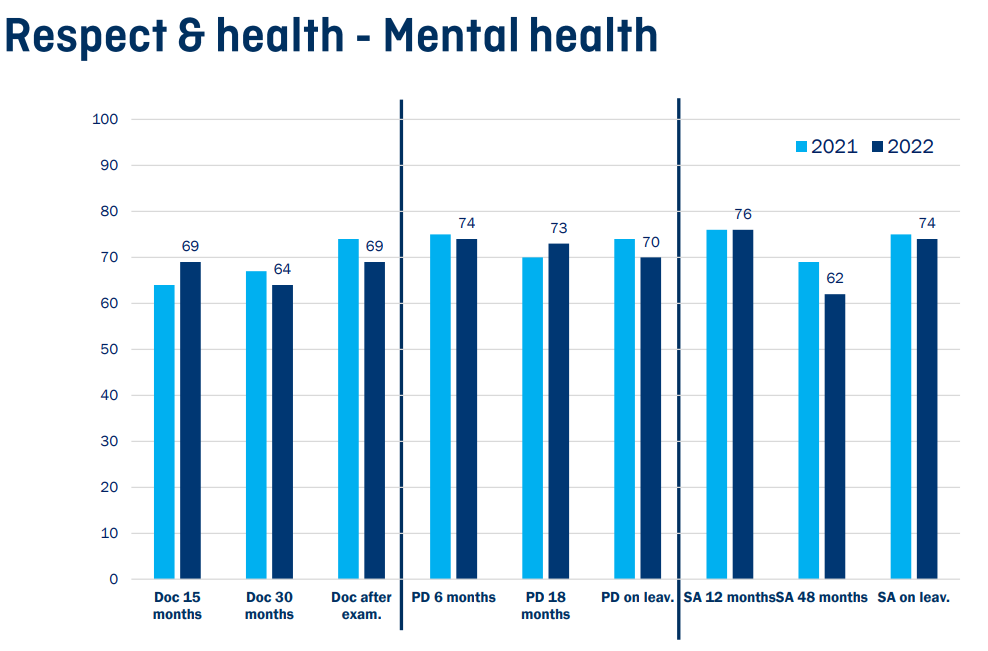Results of the 2022 survey of scientific staff
How are our scientific staff doing? In order to be able to answer this question better, ETH Zurich has conducted surveys among its doctoral students, postdoctoral researchers and senior assistants in the last three years. The collected results are now available.

ETH Zurich has conducted regular surveys among its doctoral students since November 2020 and since February 2021 among its postdoctoral researchers and senior assistants (see News from the Executive Board, 31 August 2020). Scientific staff have the opportunity in these surveys to speak out on issues such as support, personal and professional development, employment conditions, respect, health and further career planning. The aim is to obtain regular feedback from scientific staff in order to identify at an early stage where improvements are necessary. The survey is conducted at three different points of time: for doctoral students the first time 12 to 15 months after they start work on their doctoral thesis; the second after 36 to 42 months; and the last time after they have completed their doctoral examination. The timing of the surveys for postdoctoral researchers and senior assistants is slightly different.
Support, treatment within the group and employment conditions
Across all the groups surveyed (response rate 35.8%, around 1,400 participants), a positive picture emerges for the following points that also confirms the good results of the 2021 employee survey:
- General satisfaction is pleasing:
- The satisfaction of the ETH members canvassed with the support they receive also lies at a high level across almost all three groups of scientific staff and points of time. The only exception here is senior assistants after 48 months, although there are only few responses for this:
- Mutual treatment within the research group is found to be fair and respectful.
- The employment conditions are also considered fair, although doctoral students are more critical of the salary rates, and postdoctoral researchers and senior assistants are altogether considerably more satisfied with the employment conditions:
- The survey participants altogether consider their mental health to be good. However, the issue is viewed somewhat more critically by various groups surveyed, such as senior assistants and women survey participants (see below). Mental health is therefore an issue that needs to be improved on an ongoing basis:
Support with mental challenges
Many people are confronted with mental health problems at some point in their lives. In order to overcome difficult phases of life, challenges or crises, psychological support or counselling can be useful. An overview of the support offered at ETH Zurich can be found on the ETH website “Support with mental challenges”.
Results by group surveyed and gender
Interesting differences emerge when comparing the results of the three groups of scientific staff surveyed:
- Doctoral students are altogether more satisfied than in the 2021 employee survey and more familiar with the contact and advice services. While they are generally critical of the benefits of the research plan, they have a positive view of the onboarding events. Depending on their department, they are less satisfied with salaries and rate their mental health more critically.
- Postdoctoral researchers display a high level of satisfaction, albeit slightly lower than the results of the 2021 employee survey. They are particularly satisfied with the employment conditions. They view the handling of pressure critically and satisfaction with support is down compared with the employee survey.
- Senior assistants are satisfied with leadership support, conflict management and employment conditions. Their overall satisfaction is significantly lower in the survey conducted after 48 months. This particularly concerns satisfaction with their scientific career path, leadership support, respectful treatment and mental health. Altogether this is the stage with the most critical assessments, which can be explained by the major uncertainty concerning their career prospects.
- Women survey participants rate most aspects, such as health, the employment conditions and overall satisfaction, slightly lower than their male colleagues. Women also view conflict management, coping with pressure and mental health slightly more critically.
The results of the survey are comparable between the departments. Differences emerge above all on the issue of employment conditions. One reason for this may be the varying practices regarding salary rates.
Improvement potential and measures
As well as these generally positive results, there are also areas that are viewed critically by the groups of scientific staff surveyed. Here is where there is improvement potential:
Remuneration: Doctoral students, particularly in departments with lower salary rates, are generally critical on the issue of remuneration. In order to discuss this further and define possible measures, a working group led by Julia Dannath, Vice President for Personnel Development and Leadership, has already been addressing questions concerning doctoral students’ salaries since the start of this year (see Internal news, 19 December 2022).
Support: The support of scientific staff is to be further improved, for example, by means of closer monitoring and raising the awareness of supervisors and doctoral students in critical situations, particularly in cases of doctoral studies being abandoned or doctoral supervisors resigning (see Directives for Doctoral Students Employed at ETH Zurich), performance problems in doctoral studies or long-term absence due to illness. A guideline (in German only) for supervisors and doctoral students contains information about employment issues, in particular concerning the employment contract, holiday entitlement, the procedure in case of illness and rights and obligations pertaining to doctoral studies. There are also further support services for supervisors, postdoctoral researchers and senior assistants on the issues of career and development.
Outlook
The Executive Board acknowledged the results of the survey of scientific staff and the fields of action arising from them in early May 2023 and has decided to continue the survey this year. Information about the results of the 2023 survey will accordingly be provided next year.
Further information about the survey
The result reports for the 2022 survey of scientific staff can be found on this website.
Always up to date
Would you like to always receive the most important internal information and news from ETH Zurich? Then subscribe to the "internal news" newsletter and visit Staffnet, the information portal for ETH employees.




Comments
No comments yet